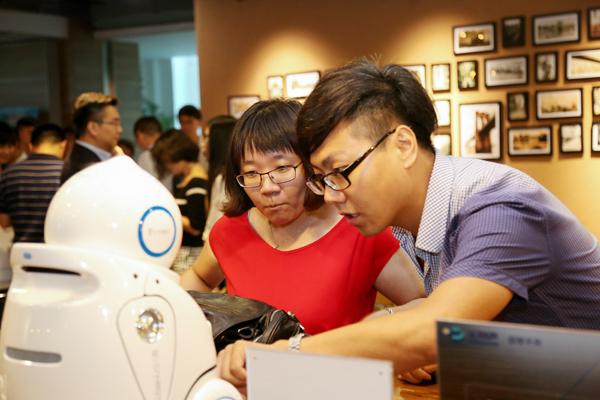BEIJING, Feb. 24 (Xinhua) -- Imagine this: you ask "someone" around you to book a hotel room in a nearby suburb. And then the person not only makes the reservation for you but reminds you to pack more clothes due to the low temperature there. Isn't that sweet and warm?
Only, the kind "person" is a voice-controlled virtual assistant in real life. These days, such assistants could come in the form of household appliances, an intelligent rearview mirror or a speaker.
The intelligent voice technology is receiving the spotlight in various fields: smart homes, intelligent driving, healthcare and education.
Unisound, a voice recognition and processing technology provider in China, is one of the players that are pioneering application of artificial intelligence in the field of voice technology.
Seeing the internet of things as a future trend, the company provides AI chips, AI user interfaces and AI services for intelligent voice functions for companies and institutions.
Huang Wei, chief executive officer of Unisound, says the conversation will be the next big way to interact with things.
"I agree with the vision articulated in 'Conversation as a Platform'. Voice is the most natural way to connect. With the development of smart devices, voice interaction will become the future trend."
Founded in 2012, the Beijing-based technology startup has obtained several intellectual property rights of intelligent voice recognition technology. It has a complete technology architecture of AI based on machine learning, big data and computing platform.
The company claims that it owns the largest independent third-party voice cloud platform in China which supports more than 100 million devices.
To date, the Beijing-based startup has worked with several leading appliance manufacturers including Gree, Haier, Hisense and TCL and produced millions of smart home devices.
With the help of Unisound, home appliances such as refrigerators and air conditioners can hear and respond accordingly to consumers' voice commands, and then make decisions and necessary adjustments to, say, the indoor temperature.
In healthcare, Unisound is the first provider of medical cloud service in China. Last year, nearly 100 hospitals nationwide tested the service. Doctors could use voice input instead of typing words to save the medical records. The company said the doctors could save nearly 1.5 to 2 hours per day.
Although the exact figures are not available, it is learnt that the company earned tens of millions of yuan in sales revenue last year.
Zhu Zhongliang, an academician at the Chinese Academy of Sciences, said in January at a big data conference in Chengdu that he is optimistic about the future development of intelligent voice.
"In recent years, the global intelligent voice market grew rapidly. In future, those related intelligent devices will enter every home."
According to data of China's Ministry of Industry and Information Technology, sales of the global intelligent voice market will likely reach an estimated USD11.24 billion yuan this year, up 37 percent year-on-year.
(China Daily)




 A single purchase
A single purchase









